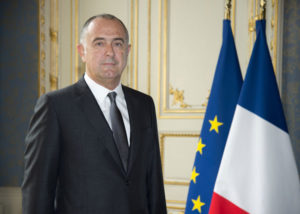
Could you introduce to us your missions and your expertise? What are the key figures for the sectors of activity you represent? What is your vision of the food industry of tomorrow? What are the constraints and objectives to be met?
I am pleased to have this opportunity to express myself regarding the food issue. Too often agriculture is limited to production, forgetting the main purpose of its mission, namely food. Europeans have an increasing desire for a quality diet and we, the consumers that we are, realize that the front-end issues are about how we produce. With over 4 million jobs in agribusiness in Europe, the Union manages to feed 741 million people. As we move towards ecological transition, it can and must do better. It is true that France has benefited from a favourable environment that makes its production varied and abundant.
The French food model that I support must first of all facilitate everyone’s access to an adequate quantity and quality of food. It is our duty to reduce food insecurity and famine. But the fight against obesity is also a priority which is reflected in educational actions. Eliminating hunger means improving nutrition and health, and committing to the 2030 Sustainable Development Goals without delay.
What societal and territorial issues do you face? What are your concrete actions to ensure a healthier, safer and more sustainable diet?
Increased interaction that affects our eating habits must not lead us to lose sight of the need to decrease the distance between production and consumption areas. This does not apply only to Europe, but across the globe. We also need to better inform consumers; strengthen transparency and traceability systems.
In the law resulting from the General States of Food, we wanted that out of the 3.7 billion meals served in France in the collective catering every year, be established the obligation for catering establishments to increase to 50% quality and sustainable products, including at least 20% organic products. Thus, by the 1st of January 2022 at the latest, meals served in collective catering in all establishments entrusted with a public service mission will be required to meet the standards.
It is also essential to sensitize young people to effectively fight against food waste and to educate them to taste. I am referring here to the Patrem project which associates Mucem with a network of agricultural high schools in the PACA region and whose aim is to compare farmers’ and fishermen’s everyday objects with original artistic productions of high school students inspired by life stories collected on field. It’s a bit like the marriage of art and life around food tradition.
The French Mission of Heritage and Food Cultures, which obtained the inscription by UNESCO of the gastronomic meal of the French on the representative list of the intangible cultural heritage almost ten years ago, is inspired by the same foundations. Originally, this intangible heritage is transmitted from generation to generation by communities or groups based on their environment and their interaction with nature and history. In order to keep the social practice of these traditions alive, the relationship between taste and health is a marker equally as critical as the inextricable link between the soil and the diversity of its productions.
What are the European projects which you participate in, and why?
I recently participated in an international symposium at UNESCO “Taste for consumer health and sustainable development” whose title was sufficiently explicit. It promises a bouquet of events that should be held next year. Six French ministries, the first of which is the Ministry of Culture, are involved in the process as well as the network of 5000 restaurants participating in Good France throughout the world. Ten years after the inscription by UNESCO of the gastronomic meal of the French on the representative list of the intangible cultural heritage, the President of the Republic wished that be held in Paris in March 2020, an international forum dedicated to the future of gastronomy. The updating of an inventory of French culinary resources, initiated by Jean FERNIOT in the mid-80s, will be partly entrusted to agricultural high schools. In this spirit, the renewed Culture-Agriculture Convention of 2014 integrated the food dimension.
Ambassadors like Philippe Faure and Alain Ducasse will help us shed light on France’s work to promote our action. But this is not France’s exclusive prerogative. Each country is custodian of culinary traditions and tastes. Sharing a meal is an invitation to learn about each other’s culture, and to enrich oneself with interbreeding so as to reinvent one’s own tradition.
The other project in which we are invested is that of the cities of gastronomy which was one of the key features of France’s candidacy. The strength of this concept is that the four selected cities (Lyon, Dijon, Tours and Paris-Rungis) are working as a network. This has the merit of facilitating the exchange of experiences and project engineering. Thanks to the support of very active university centres, and the involvement of professionals, each has been able to develop a specific activity that emphasizes its identity. Tours along with Villa Rabelais has developed a project focused on food uses and the territory. Lyon has set up a scientific committee working on the link between food and health. Dijon created the “Culture and Wine Tradition” Chair and Paris-Rungis intends to benefit from the development of Greater Paris by 2024 during the Olympic Games, to highlight its digital project around local products.

















